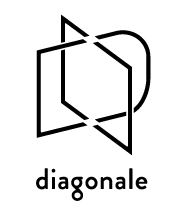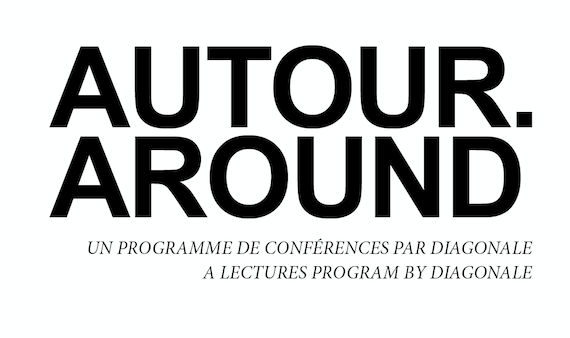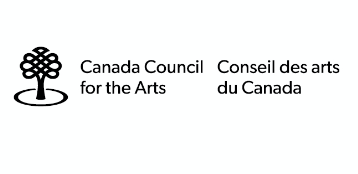The lectures program Around is developed by Diagonale. Around is intended to foster discourse about the themes raised by the centre’s exhibitions, with invited experts from different fields.
#3
2023.04.13
Conversation: “The human future in the light of a new apprehension of the world”
5:30 - 7:30 pm. Online
With: Laurie Gagnon-Bouchard, Renato Rodriguez-Lefebvre, Miriam Sbih
Moderator: Galadriel Avon
The context of the unprecedented environmental crisis poses many questions about our uncertain futures. To some, the sense of unease that it elicits is necessary to the incubation of new critical theories that ontologically and epistemologically re-examine a phallocentric, Eurocentric and colonial world history. It is generally agreed that one of the contributing factors to a climate crisis that now affects all species is the rupturing of the connection between humankind and the living and non-living entities that share degrees of existence and knowledge distinct from humanity. Attempts to repair the situation can be seen in various fields, and we reflect on our relationships with our environment and the things and beings with which we cohabit, asking, what are we, and how can we redefine our individual and collective ways of inhabiting the world in light of what these other elements are telling us?
Held following the exhibitions 'As the Days Move into Nights' by Paul Maheke and 'Three Scores for Dawn and Dusk' by Lou Sheppard, this conference considers artistic research recently presented at Diagonale and seeks to give new life to its semantic, reflexive and theoretical reverberations. With participating researchers from diverse fields, we hope this discussion will bring together scientific discourses from their specific expertise, to create an ecosystem of ideas through which we can reimagine our apprehensions.
Zoom link : https://us06web.zoom.us/j/87836806264?pwd=VVhrK014NCtXVGdPUURucDJMMzNXZz09
#2
2022.06.3
'Conditions of the female body: aesthetics and politics'
6 – 7 p.m. at Diagonale
If the body manifests experience (Merleau-Ponty, 1945), it is also the vector that drives our relationship with the world and the ‘place and time in which the world takes form in flesh’ (Le Breton, Anthropologie du monde et de la modernité, 2013, p.17). The body is a social and cultural construction, a ‘symbolic material, the object of representations and imaginings’ (Le Breton, Sociologie du corps, 1992, p.4). We absorb our existence through it, moving through space and adopting different physical states; juxtaposing diverse corporeal conditions in a clear attempt to find purpose. Seen as both matter and medium, the body is also the site of multiple challenges when it is considered and experienced as female. These fluid conditions challenge the boundaries between the personal and the public, between the inner and outer self, from one person to another.
This conference, which will coincide with Maude Bernier Chabot’s exhibition "Quelque chose comme", is an opportunity to hear and engage with Enora Rivière, a choreographer and writer on the dancing body’s states of presence, Sara Danièle Michaud, an author whose most recent essay is about becoming a mother, and Thérèse St-Gelais, a professor in art history at UQAM who specializes in gender and feminism.
Biographies
------
Thérèse St-Gelais is a tenured professor in the department of art history at the Université du Québec à Montréal (UQAM), where she is also director of the Institut de recherches et d’études feministes. She teaches graduate students the history of contemporary art, women’s contributions to the visual arts and art history, and feminist studies. She also curates exhibitions.
Enora Rivière has collaborated with numerous European artists as a dancer, dramatist, coach and tour director. Her choreographic and literary projects (such as ob.scène, and moteur) have been presented at OFFTA, the Festival Ardanthé in Vanves (France), and the La Chapelle theatre, among other venues. She has been a dance critic for the Devoir and has written for Liberté magazine. Through her projects, Rivière interrogates the dancer’s ‘voice’ as a space of political and aesthetic discourse. She is interested in the articulation of language and the body, and more precisely in identifying the driving forces of movement as states of presence.
Sara Danièle Michaud completed a doctorate in comparative literature at the Université de Montréal and carried out postdoctoral research on conversion writing at the University of Toronto (Écrire. Se convertir, Hashtag, 2018). She is a writer and teaches at the Cégep de Saint-Laurent. Her most recent essay, Cicatrices; Carnets de conversion, was published in January. She considers writing to be essential – because it is performative – to the ambiguous corporeality of the maternal/mystical body. Writing finds a place in the inactive mother-body, when the wildness leaves the body to make matter elsewhere.
#1
2022.03.10
‘Re-enactments: remembrance, territories and potential narratives’
From 5pm to 6:30pm. Online
Aboriginal artefacts can evince a tradition, heritage, or inner and imagined physical territory. They are bearers of multiple stories and, as such, their status and value can be subject to change, depending on the context in which they are represented. This is not without consequence for aboriginal identities and cultures. If objects can be considered as sites of memory and knowledge, how does the context of their presentation effect the way in which they speak to audiences, and which stories are told?
This conference, which runs in parallel with Maria Hupfield’s exhibition Manidoowegin and is an opportunity to hear different speakers talk about their practices and present their research projects:
Giving new life to objects - Elisabeth Kaine
Elisabeth Kaine of the Wendate nation is an associate professor and co-holder of the UNESCO Chair entitled The Transmission of First Peoples’ Culture to Foster Well-being and Empowerment. Founder of the Boite rouge VIF and Design et Culture matérielle, she has also curated exhibitions, such as Indigenous Voices of Today: Knowledge, Trauma, Resilience at the McCord Museum.
The spirit of objects as a means of decolonization and autochtonization of exhibition spaces - Marie-Charlotte Franco
Marie-Charlotte Franco is a non-native museologist, lecturer and postdoctoral fellow at the Centre interuniversitaire d’études et de recherches autochtones (CIÈRA).
Sacred objects, living matter - Eruoma Awashish
Eruoma Awashish of the Atikamekw Nehirowisiwautour nation is a multidisciplinary artist, researcher, curator and member of the Dimes Project collective, mentored by Maria Hupfield. The decolonization of the sacred is central to her practice.
-
Diagonale would like to underline that we are located on unceded Indigenous lands. The Kanien’kehá:ka Nation is recognized as the custodians of the lands and waters on which we gather today. Tiohtià:ke/Montréal is historically known as a gathering place for many First Nations. Today, it is home to a diverse population of Indigenous and other peoples. We respect the continued connections with the past, present and future in our ongoing relationships with Indigenous and other peoples within the Montreal community.
2023.04.13
Conversation: “The human future in the light of a new apprehension of the world”
5:30 - 7:30 pm. Online
With: Laurie Gagnon-Bouchard, Renato Rodriguez-Lefebvre, Miriam Sbih
Moderator: Galadriel Avon
The context of the unprecedented environmental crisis poses many questions about our uncertain futures. To some, the sense of unease that it elicits is necessary to the incubation of new critical theories that ontologically and epistemologically re-examine a phallocentric, Eurocentric and colonial world history. It is generally agreed that one of the contributing factors to a climate crisis that now affects all species is the rupturing of the connection between humankind and the living and non-living entities that share degrees of existence and knowledge distinct from humanity. Attempts to repair the situation can be seen in various fields, and we reflect on our relationships with our environment and the things and beings with which we cohabit, asking, what are we, and how can we redefine our individual and collective ways of inhabiting the world in light of what these other elements are telling us?
Held following the exhibitions 'As the Days Move into Nights' by Paul Maheke and 'Three Scores for Dawn and Dusk' by Lou Sheppard, this conference considers artistic research recently presented at Diagonale and seeks to give new life to its semantic, reflexive and theoretical reverberations. With participating researchers from diverse fields, we hope this discussion will bring together scientific discourses from their specific expertise, to create an ecosystem of ideas through which we can reimagine our apprehensions.
Zoom link : https://us06web.zoom.us/j/87836806264?pwd=VVhrK014NCtXVGdPUURucDJMMzNXZz09
#2
2022.06.3
'Conditions of the female body: aesthetics and politics'
6 – 7 p.m. at Diagonale
If the body manifests experience (Merleau-Ponty, 1945), it is also the vector that drives our relationship with the world and the ‘place and time in which the world takes form in flesh’ (Le Breton, Anthropologie du monde et de la modernité, 2013, p.17). The body is a social and cultural construction, a ‘symbolic material, the object of representations and imaginings’ (Le Breton, Sociologie du corps, 1992, p.4). We absorb our existence through it, moving through space and adopting different physical states; juxtaposing diverse corporeal conditions in a clear attempt to find purpose. Seen as both matter and medium, the body is also the site of multiple challenges when it is considered and experienced as female. These fluid conditions challenge the boundaries between the personal and the public, between the inner and outer self, from one person to another.
This conference, which will coincide with Maude Bernier Chabot’s exhibition "Quelque chose comme", is an opportunity to hear and engage with Enora Rivière, a choreographer and writer on the dancing body’s states of presence, Sara Danièle Michaud, an author whose most recent essay is about becoming a mother, and Thérèse St-Gelais, a professor in art history at UQAM who specializes in gender and feminism.
Biographies
------
Thérèse St-Gelais is a tenured professor in the department of art history at the Université du Québec à Montréal (UQAM), where she is also director of the Institut de recherches et d’études feministes. She teaches graduate students the history of contemporary art, women’s contributions to the visual arts and art history, and feminist studies. She also curates exhibitions.
Enora Rivière has collaborated with numerous European artists as a dancer, dramatist, coach and tour director. Her choreographic and literary projects (such as ob.scène, and moteur) have been presented at OFFTA, the Festival Ardanthé in Vanves (France), and the La Chapelle theatre, among other venues. She has been a dance critic for the Devoir and has written for Liberté magazine. Through her projects, Rivière interrogates the dancer’s ‘voice’ as a space of political and aesthetic discourse. She is interested in the articulation of language and the body, and more precisely in identifying the driving forces of movement as states of presence.
Sara Danièle Michaud completed a doctorate in comparative literature at the Université de Montréal and carried out postdoctoral research on conversion writing at the University of Toronto (Écrire. Se convertir, Hashtag, 2018). She is a writer and teaches at the Cégep de Saint-Laurent. Her most recent essay, Cicatrices; Carnets de conversion, was published in January. She considers writing to be essential – because it is performative – to the ambiguous corporeality of the maternal/mystical body. Writing finds a place in the inactive mother-body, when the wildness leaves the body to make matter elsewhere.
#1
2022.03.10
‘Re-enactments: remembrance, territories and potential narratives’
From 5pm to 6:30pm. Online
Aboriginal artefacts can evince a tradition, heritage, or inner and imagined physical territory. They are bearers of multiple stories and, as such, their status and value can be subject to change, depending on the context in which they are represented. This is not without consequence for aboriginal identities and cultures. If objects can be considered as sites of memory and knowledge, how does the context of their presentation effect the way in which they speak to audiences, and which stories are told?
This conference, which runs in parallel with Maria Hupfield’s exhibition Manidoowegin and is an opportunity to hear different speakers talk about their practices and present their research projects:
Giving new life to objects - Elisabeth Kaine
Elisabeth Kaine of the Wendate nation is an associate professor and co-holder of the UNESCO Chair entitled The Transmission of First Peoples’ Culture to Foster Well-being and Empowerment. Founder of the Boite rouge VIF and Design et Culture matérielle, she has also curated exhibitions, such as Indigenous Voices of Today: Knowledge, Trauma, Resilience at the McCord Museum.
The spirit of objects as a means of decolonization and autochtonization of exhibition spaces - Marie-Charlotte Franco
Marie-Charlotte Franco is a non-native museologist, lecturer and postdoctoral fellow at the Centre interuniversitaire d’études et de recherches autochtones (CIÈRA).
Sacred objects, living matter - Eruoma Awashish
Eruoma Awashish of the Atikamekw Nehirowisiwautour nation is a multidisciplinary artist, researcher, curator and member of the Dimes Project collective, mentored by Maria Hupfield. The decolonization of the sacred is central to her practice.
-
Diagonale would like to underline that we are located on unceded Indigenous lands. The Kanien’kehá:ka Nation is recognized as the custodians of the lands and waters on which we gather today. Tiohtià:ke/Montréal is historically known as a gathering place for many First Nations. Today, it is home to a diverse population of Indigenous and other peoples. We respect the continued connections with the past, present and future in our ongoing relationships with Indigenous and other peoples within the Montreal community.



